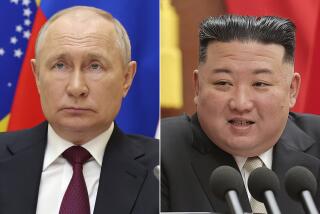Tillerson reveals U.S. is in direct contact with North Korea
Reporting from BEIJING — Secretary of State Rex Tillerson acknowledged in Beijing on Saturday that the Trump administration is in “direct contact” with North Korea over its recent escalation of missile and nuclear tests.
“We’re not in a dark situation, a blackout,” Tillerson said at a briefing with some reporters in China. “We have a couple, three channels open to Pyongyang. We can talk to them, we do talk to them.”
“Stay tuned,” he said.
The acknowledgment suggests a potential deescalation after months of bellicose rhetoric on both sides, as well as repeated, provocative intercontinental ballistic missile tests and a nuclear test by North Korea. President Trump has threatened to rain “fire and fury” on North Korea, and destroy the country of 25 million people. In September, the isolated state’s leader Kim Jong Un called Trump a “mentally deranged U.S. dotard,” and Trump in turn has taken to calling him “Little Rocket Man.”
North Korea has not dialed back its war of words; on Saturday, its state media released a statement accusing Trump of working toward a “suicidal act of inviting a nuclear disaster that will reduce America to a sea of flames.”
Tillerson also said it was essential “to calm things down” between North Korea and the United States and its allies. Asked if that pertained to Trump as well, Tillerson told reporters, “I think the whole situation is a bit overheated right now. I think everyone would like for it to calm down.”
The secretary of State was in China in part to prepare for Trump’s trip there in November. The president also will visit Japan and South Korea, the two allies most directly affected by North Korea’s aggressions, as well as Vietnam and the Philippines.
Before Tillerson began his meetings with officials in Beijing, the state-run China Daily warned that his trip should be “anything but symbolic.”
The English-language paper, in a surprisingly edgy editorial on Thursday evening, demanded the visit go beyond the “routine show of mutual goodwill to set the stage for Trump’s visit” and “straighten at least one thing out — what each can expect from the other to ensure the situation on the Korean Peninsula does not deteriorate and spiral out of control.”
China’s Ministry of Commerce said Thursday that it would require North Korean businesses and joint ventures in China to close, in keeping with the latest round of United Nations sanctions. North Korea operates restaurants in several Chinese cities and its laborers work in factories across the country. Much of their income goes directly to the North Korean government.
The Commerce Ministry announced last week that it would cut off natural gas and textile exports immediately and limit annual petroleum exports starting Jan. 1. Officials said the measures were in accordance with U.N. sanctions intended to thwart North Korea’s nuclear ambitions.
The Trump administration has welcomed the recent crackdowns on North Korea by China, which is Pyongyang’s main ally and economic patron. Beijing had been openly opposed to North Korea’s provocations, and joined the United States and others at the United Nations in approving sanctions, yet Trump and his top advisors have repeatedly complained that China is not doing enough to pressure Kim to cease his nuclear weapons program.
After meetings with Chinese President Xi Jinping and other officials in Beijing, Tillerson said he thinks China has become deeply concerned about the North’s missile and nuclear programs and is working hard to persuade Pyongyang to reenter talks. Tillerson did not say specifically what form those talks should take.
Meyers is a special correspondent. The Associated Press contributed to this report.
For more news from Asia, follow @JRKaiman on Twitter
ALSO
China orders North Korean businesses closed under United Nations sanctions
North Korea says Trump declared war via tweet. The White House says it didn’t
More to Read
Sign up for Essential California
The most important California stories and recommendations in your inbox every morning.
You may occasionally receive promotional content from the Los Angeles Times.










